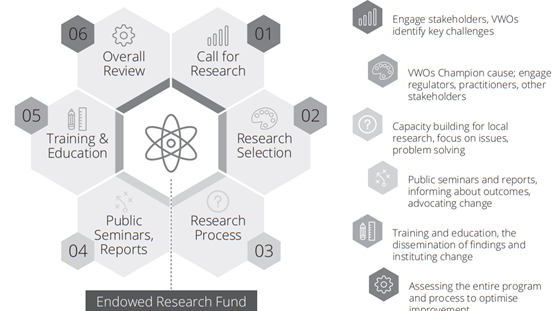Philanthropic Collaboration in Practice Research: The Mrs Lee Choon Guan Endowed Research Fund Model, Singapore
April 9, 2023

The Mrs Lee Choon Guan Endowed Research Fund (LCG ERF) was launched officially on 10 April 2017. It is the first endowment made in Singapore to establish a research fund specifically for practice research in social work that would impact the development and delivery of social services. The LCG ERF is one of the philanthropic programmes supported by the Mrs Lee Choon Guan Trust Fund, which was established to engage and continue the legacy of charitable work left behind by the late Mrs Lee.
In ‘Philanthropic Collaboration in Practice Research: The Mrs Lee Choon Guan Endowed Research Fund Model, Singapore’ (The Routledge Handbook of Social Work Practice Research, 2020), Dr Rosaleen Ow, Dr Isabel Sim, and Associate Professor Esther Goh (all from NUS Social Work) reviewed the establishment of LCG ERF.
The LCG ERF was established as part of the Trust Fund’s wishes to continue its contribution towards meaningful development on the provision of social services to the needy. This led to a partnership with NUS in establishing an initiative that could enhance social service development through research in the local social service sector, i.e., the LCG ERF. The fund resources the NUS Department of Social Work to engage practising social workers in conducting practice research that will enhance service provision and diversity.
However, there are ambiguities as to what constitutes practice research. In order to ensure that the fund would resource significant aspects of practice research with maximal impact in the local context, the fund managers engaged in a series of fact-finding activities. They first identified the type of research that had been conducted so far on social work practice, and they then sought to find out what practitioners believed and knew about practice research, since it was still a relatively new concept.
The results of the focus group discussions indicated that practice research might refer to social work practitioners working within a research framework and could include studying the processes of social work practice itself. Moreover, the fund managers realised that collaboration in practice research need to be based on synergising the strengths of different partners. It requires the philanthropic donor to have some understanding of the social issues in the community and fund management, whereas other partners need to clearly recognise the donor’s intended deliverables from the collaboration. In order to ensure that the collaboration can meet the objectives of the stakeholders as closely as possible, a model was thereby devised for collaboration in practice research (see image below).
After consolidating the objectives and the work plans, the LCG ERF invested in the preparation for the launch of the fund, including hosting public lectures, consultation and coaching sessions for social workers, a practice research conference themed on practice research, and a call for research proposals. Ultimately, the LCG ERF awarded grants to five research proposals.
Towards the future, the collaboration between NUS and the Trust Fund, which emphasises equal partnership, showcases that universities are embarking on their new mission of fostering links with knowledge users and facilitating technology transfers.
Read the chapter here: https://www.routledge.com/The-Routledge-Handbook-of-Social-Work-Practice-Research/Joubert-Webber/p/book/9780367189525
